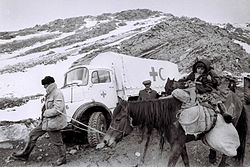Background

In 1988, following the outbreak of the First Karabakh War, Azerbaijan faced the threat of violation of its territorial integrity. In 1992, the war began to escalate and numerous diplomatic efforts failed. [4] Following the increasingly complicated refugee problem, Azerbaijan became the first CIS state to join the UN Convention on the Status of Refugees and the 1967 Protocol in February 1993, along with Russia. [5] [6] Azerbaijan could sustain its resistance, however, by the middle of 1993, it had lost control of Nagorno-Karabakh and several regions which were recently liberated in counteroffensive. [7] [8]
Soon after, Armenian forces captured the Kalbajar District in violation of the laws of war. [8] On 30 April 1993, the UN Security council adopted resolution 822 demanding "withdrawal of all occupying forces from the Kelbadjar district and other recently occupied areas of Azerbaijan" and calling for "unimpeded access for international humanitarian relief efforts in the region ... to alleviate the suffering of the civilian population". [9] Less than a week after the capture, the State Committee of Azerbaijan for Refugees and IDPs reported that 9,582 families from Kalbajar were registered. [10] During the summer, the Armenian forces made significant gains into Agdam, non-implementing the UN resolution. [8] By the end of 1993, the Azerbaijan–Iran border of 132 kilometers was under the Armenian control. [11] As per estimates by Thomas de Waal, the conflict made Azerbaijan the "leader" in the world with the number of refugees per capita, as every tenth person in the country was forced to leave his home due to the conflict, [7] whereas the UNHCR assessed it as one out of eight people. [12]
By turning approximately one million Azerbaijanis into IDPs, the large-scale warfare led to the humanitarian crisis that Azerbaijan could not deal with it alone. [4] [13] Amidst an exacerbated and deteriorated situation, the government successively enacted legislative acts providing concessions and guarantees for refugees and IDPs. [14] Starting in January 1993, the UN launched a humanitarian aid programme in Azerbaijan, to be effective by May. After the occupation of Kalbajar and other regions, the number of IDPs greatly increased and it led to more requests from Azerbaijan, consequently an expansion of the scope of aid, even if it did not change essentially. [15] In June 1993, considering the rapid deterioration of the humanitarian situation in Azerbaijan, the UN organized an interagency humanitarian programme. [16] Although the program lasted from 1 July 1993 until 31 March 1994, [1] shortly after its commencement, it found the number of refugees and IDPs exceeding one million. [16]
As mentioned in the resolution No. 48/114, until adoption of this document, a number of states, especially neighboring countries, provide necessary humanitarian aid to Azerbaijan. Turkish Red Crescent allocated tent camps and clothes for up to 100,000 displaced people in Agjabadi and Barda. However, in 1996, due to lack of funds, the organization was forced into leaving the country, handing over the tents to the International Red Cross and Red Crescent Society. [17] On 6 September 1993, Azerbaijan signed a humanitarian aid protocol with Iran. Accordingly, Helal Ahmar set up 7 tent camps for 55,000 IDPs within a month. [11] Fearful of possible social instability in its northern border which was mostly populated by ethnic Azerbaijanis, Iran dispatched tents for 100,000 displaced people in the border region of Imishli and transported IDPs who forcibly fled over the Aras river into Iran after occupation of Zangilan District. [8]
